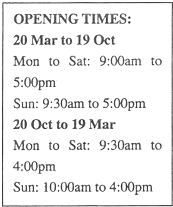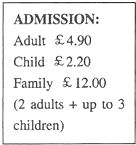题目内容
19.You are the collector in the gallery of your life.You collect.You might not mean to but you do.One out of three people collects tangible(有形的)things such as cats,photos and noisy toys.There are among some 40collections that are being shown at"The Museum Of"-the first of several new museums which,over the next two years,will exhibit the objects accumulated by unknown collectors.In doing so,they will promote a popular culture of museums,not what museums normally represent.
Some of the collections are fairly common-records,model houses.Others are strangely beautiful-branches that have fallen from tree,for example.But they all reveal (显露)a lot of things:ask someone what they collect and their answers will tell you who they are.
Other on the way include"The museum of Collectors"and"The Museum of Me."These new ones,it is hoped,will build on the success of"The Museum Of."The thinkers behind the project want to explore why people collect,and what it means to do so.They hope that visitors who may not have considered themselves collectors will begin to see they,too,collect.
Some collectors say they started or stopped making collections at important point:the beginning or end of adolescence-"it's a growing-up thing; you stop when you grow up,"says one.Other painful times are mentioned,such as the end of a relationship.For time and life can seem so uncontrollable that a steady serial(顺序排列的)arrangement is comforting.
64.How will the new museums promote a popular culture of museums?B
A.By collecting more tangible things.
B.By showing what ordinary people have collected.
C.By correcting what museums normally represent.
D.By accumulating 40collections two years from now.
65.What can be learned about collectors from their collections?A
A.Who they are.
B.How old they are.
C.Where they were born.
D.Why they might not mean to collect.
66.Which of the following is an aim of the new museums?C
A.To help people sell their collections.
B.To encourage more people to collect.
C.To study the significance of collecting.
D.To find out why people visit museums.
67.According to the last paragraph,people may stop collecting when theyA
A.become adults
B.feel happy with life
C.are ready for a relationship
D.feel time to he uncontrollable.
分析 本文是说明文,文章主要介绍一些新博物馆,收藏的是普通人的收藏品,他们这么做的目的是想通过展示普通人收集的东西来促进博物馆文化的,研究收藏的重要性.
解答 64.B 细节理解题.根据文章第二段的第二、三行的句子"the first of several new museums which,over the next twoyears,will exhibit the objects accumulated by unknown collectors.In doing so,they will promote a popular culture of museums,not what museums normallyrepresent."可知,新的博物馆是通过展示普通人收集的东西来促进博物馆文化的,故选B.
65.A 细节理解题.根据文章第三段的最后一个句子"But they all reveal (显露)a lot of things:asksomeone what they collect and their answers will tell you who they are."可知从人们的收藏中可以看出他们是什么样的人,故选A.
66.C 细节理解题.根据文章第四段第四行的句子"The thinkers behind the project want to explore why peoplecollect,and what it means to do so.They hope that visitors who may not haveconsidered themselves collectors will begin to see they,too,collect."可知,新的博物馆是想探索人们为什么收藏,收藏的意义是什么,所以它们的目的是研究收藏的重要性,所以选C.
67.A 细节理解题.根据文章最后一段第二行的句子"it's a growing-up thing; you stop when you grow up,"says one."可知,人们在成年后会停止收集东西,所以选A.
点评 解答细节理解题时,一个常用的方法就是运用定位法,即根据题干和选项中的关键词从原文中找到相关的句子,与选项进行比较从而确定答案;推理判断题既要求学生透过文章表面文字信息推测文章隐含意思,又要求学生对作者的态度、意图及文章细节的发展作正确的推理判断,力求从作者的角度去考虑,不要固守自己的看法或观点.

 天天向上一本好卷系列答案
天天向上一本好卷系列答案 小学生10分钟应用题系列答案
小学生10分钟应用题系列答案| A. | takes up | B. | makes up | C. | looks up | D. | puts up |
His friend's main(19)interestin life seemed to be tennis.He was an excellent tennis player,and he(20)evenhad his own tennis court(网球场).There were a lot of people with swimming (21)pools,but there were only two people with private tennis court; his friend in Chicago was one of them.I told him that I knew several(22)playerslike that,including my brother,who was doctor in California.He(23)admittedthat maybe there were more private courts in the country,than he(24)realizedbut he did not know of any others.Then he asked me(25)wheremy brother lived in California.When I said Sacramento,he said that was a coincidence (巧合)(26)becausehis Chicago friend spent the summer in Sacramento last year and he lived next door to a (27)doctorwho had a tennis court in his backyard.I said I felt that really was a coincidence because my next-door neighbor had gone to Sacramento last summer and had (28)hiredthe house next to my brother's house.For a moment,we stared at each other,but we did not say anything.
"Would your friend's name happen to be Roland Kirkwood?"I asked finally.He(29)laughedand said,"Yes.Would your brother's name happen to be Dr Rey Hunter?"It was my(30)turnto laugh."Yes."I replied.
| 11.A.brother | B.teacher | C.neighbor | D.friend |
| 12.A.managed | B.happened | C.tried | D.wanted |
| 13.A.expecting | B.lying | C.joking | D.talking |
| 14.A.funny | B.serious | C.careful | D.disappointed |
| 15.A.think | B.find | C.realize | D.see |
| 16.A.indeed | B.actually | C.instead | D.exactly |
| 17.A.famous | B.interesting | C.noisy | D.big |
| 18.A.began | B.stopped | C.refused | D.failed |
| 19.A.problem | B.interest | C.choice | D.chance |
| 20.A.just | B.ever | C.even | D.surely |
| 21.A.suit | B.habit | C.pools | D.river |
| 22.A.people | B.players | C.strangers | D.friends |
| 23.A.advised | B.argued | C.admitted | D.admired |
| 24.A.recognized | B.realized | C.visited | D.found |
| 25.A.how | B.whether | C.when | D.where |
| 26.A.because | B.if | C.then | D.though |
| 27.A.doctor | B.friend | C.neighbor | D.player |
| 28.A.hired | B.visited | C.designed | D.sold |
| 29.A.smiled | B.laughed | C.cried | D.nodded |
| 30.A.chance | B.pleasure | C.time | D.turn |
---I am going to the cinema with some friends.The film quite early,so we to the bookstore after that.( )
| A. | finished; are going | B. | finished; go | ||
| C. | finishes; are going | D. | finishes; go |
| A. | apology | B. | another | C. | remote | D. | copy |
| A. | each | B. | every | C. | other | D. | another |

 The Birthplace is within easy walking distance of all the car parks shown on the map; nearest is Windsor Street(3minutes'Walk).
The Birthplace is within easy walking distance of all the car parks shown on the map; nearest is Windsor Street(3minutes'Walk).